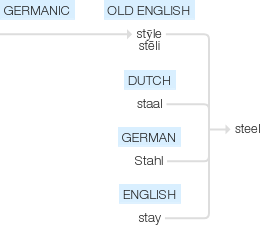Steel
Old English stȳle, stēli, of Germanic origin; related to Dutch staal, German Stahl, also to stay2. The verb dates from the late 16th century.
wiktionary
From Middle English stel, stele, from Old English stīele, from Proto-Germanic *stahliją(“something made of steel”), enlargement of *stahlą(“steel”), from Proto-Germanic *stah- or *stag-(“to be firm, rigid”), from Proto-Indo-European *stak-(“to stay, to be firm”) [1] (compare Umbrian stakaz(“upright, erected”), Avestan 𐬯𐬙𐬀𐬑𐬭𐬀 (staxra, “strong”), Sanskrit स्तकति(stákati, “resist, strike against”)), related to Proto-Indo-European *steh₂-(“to stand”). [2]
From French Bastille (a French prison). [3]
etymonline
steel (n.)
modified form of iron with a small portion of carbon, not found in nature but known in ancient times, Old English style "steel," from noun use of Proto-Germanic adjective *stakhlijan "made of steel" (source also of Old Saxon stehli, Old Norse, Middle Low German stal, Danish staal, Swedish stål, Middle Dutch stael, Dutch staal, Old High German stahal, German Stahl), related to *stakhla "standing fast," from PIE *stek-lo-, from root *stak- "to stand, place, be firm" (see stay (n.1)). The notion is perhaps "that which stands firm." No corresponding word exists outside Germanic except those likely borrowed from Germanic languages.
As an adjective from c. 1200 (Old English used stylen "*steel-en." Steel wool is attested from 1896. Steel drum is from 1952.
steel (v.)
"make hard or strong like steel," 1580s, earliest use is figurative, from steel (n.). Old English lacked the verb but had styled "made of steel." Related: Steeled; steeling.
